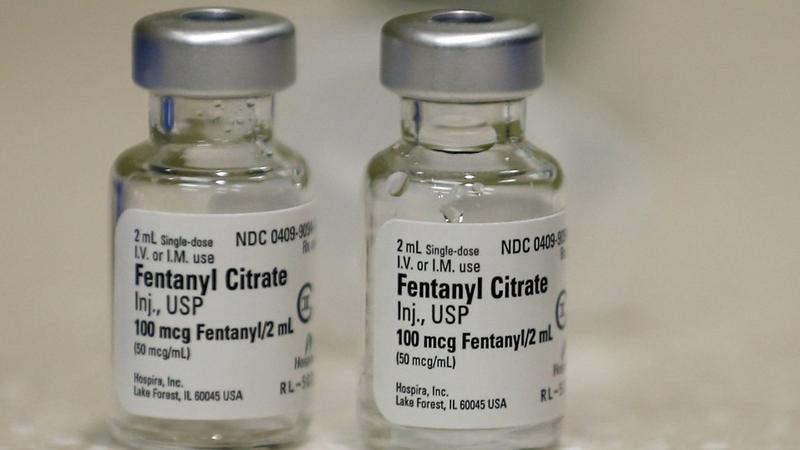Media Report

- The Washington Post reports, "China said Monday it will tighten regulation of fentanyl-related substances as a gesture to the United States, where the synthetic opioid has caused tens of thousands of overdose deaths every year and fueled a public health crisis. In a move first promised by Chinese leader Xi Jinping during a December meeting with President Trump, China will enact a blanket ban on variants of fentanyl-related substances. For years, China's vast chemical and pharmaceutical industry exploited loopholes in Chinese law to create synthetic painkillers and their precursors that were not explicitly banned. U.S. officials including Trade Representative Robert E. Lighthizer have pushed Beijing to significantly broaden its list of scheduled substances to cover the entire class of synthetic opioids, their analogues and precursors, and crack down on their unchecked production and export."
- Reuters reports, "Earlier on Sunday Taiwan scrambled aircraft to drive away the two Chinese planes, the self-ruled island's defence ministry said. China's move had 'seriously impacted regional safety and stability', the ministry said in a statement. There was no immediate reaction from Beijing, which views Taiwan as a renegade Chinese province. Huang Chung-yen, a spokesman for Taiwan's Presidential Office, said Beijing 'should stop behaviour of this sort, which endangers regional peace, and not be an international troublemaker'. President Tsai Ing-wen had urged the army 'to complete all tasks on war preparation', he added. China has repeatedly sent military aircraft and ships to circle Taiwan during drills in recent years and worked to isolate the island internationally, whittling down its few remaining diplomatic allies."
- Reuters reports, "U.S. exporters sold 828,000 tonnes of soybeans to China, the U.S. Agriculture Department said on Monday, the second sale announced since the two countries concluded their latest round of negotiations last week to end their trade war. The USDA, in its daily reporting system, said that private exporters indicated the deal was for the 2018/19 marketing year, which ends on Aug. 31. China has stepped up its purchases of U.S. soybeans during negotiations to end the trade war between the two countries but the amount purchased remained well below typical levels. The U.S. soybean stockpile has ballooned to record levels during the dispute. Trade talks are set to resume this week in Washington with a Chinese delegation led by Vice Premier Liu He. U.S. President Donald Trump said on Friday that trade talks with China were going very well, but cautioned that he would not accept anything less than a 'great deal.'"
Calendar
- 2019-03-31 America Changes The Tone In South China Sea Disputes
- 2019-03-29 China, US trade talks adjourn until next week
- 2019-03-28 China shifts position on tech transfers, trade talks progress - U.S. officials
- 2019-03-27 China Expels Former Interpol Chief From Communist Party for ‘Extravagant’ Spending
- 2019-03-26 As Europe Wrestles With How to Handle China, Xi Suggests: Trust Me
- 2019-03-25 U.S. Navy, Coast Guard ships pass through strategic Taiwan Strait
- 2019-03-24 US Vessels Sail Through Taiwan Strait, Defying China
- 2019-03-22 Trump Administration Strikes Tougher Stance Ahead of China Talks
- 2019-03-21 EU leaders to discuss stronger shield against Chinese influence
- 2019-03-20 US-China trade talks to resume after pause, US official says
News
- Reuters Taiwan condemns Beijing after Chinese jets cross maritime line
- The Washington Post China offers broad opioid curbs promised to Trump
- Reuters China books fresh deal for 828,000 tonnes of U.S. soybeans
- The Washington Post China's premier meets New Zealand's leader amid 5G dispute
- The New York Times China Purchases Could Undercut Trump's Larger Trade Goal
- Bloomberg Made-in-China Reactor Gains Favor at Home, U.S. Tech Falters
- Reuters China's Kunlun in talks with U.S. over Grindr: filing
- Bloomberg Xi Fails to Calm Europe as Juncker Takes Another Swipe at China
- The New York Times 30 Die Fighting Forest Fire in China
- CNBC China's $13 trillion bond market marks a milestone today. Here's what it means
- The Washington Post World shares surge on improved China manufacturing data
- The New York Times Chinese Dissidents Feel Heat of Beijing's Wrath. Even in Canada.
- The Washington Post Recent developments surrounding the South China Sea
Commentary
- The Diplomat Why the Pending U.S.-China Deal Will Not Suffice
- CNBC Don't blame China for unraveling US-Europe relations
- The National Interest A U.S.-China War Scenario: How Would China's Military Attack a "Great Wall in Reverse"?
- Financial Times China's bond markets still have a way to go
- Bloomberg Missing Unicorns Cast Doubt on Shanghai's Tech Dream
- The National Interest Russia and China Forced America's Hand on the INF Treaty